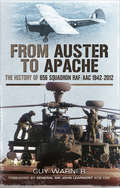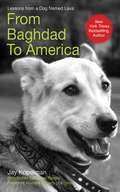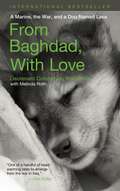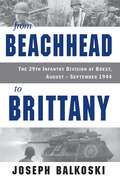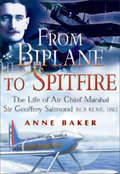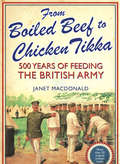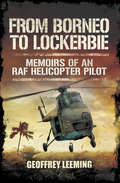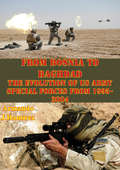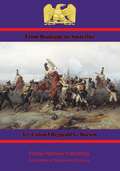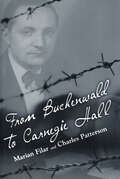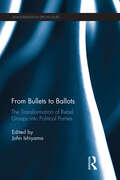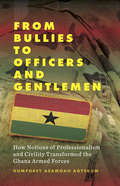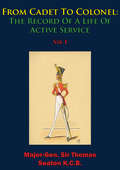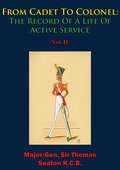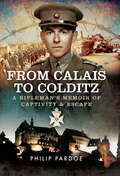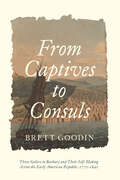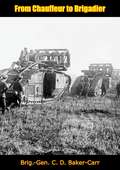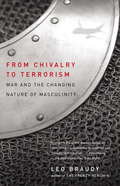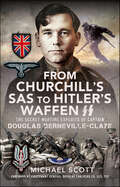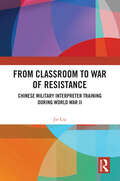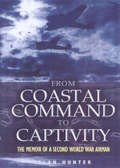- Table View
- List View
From Auster to Apache: The History of 656 Squadron RAF/ACC 1942–2012
by Guy WarnerThis is the 70th Anniversary year of 656 Squadron, which first formed on 31st December 1942. Over the intervening years the Squadron has served with great distinction in India, Burma, Java, Malaya, Borneo, Hong Kong, the UK, the Falkland Islands, Bosnia, Kosovo and, most recently, in Afghanistan. This is 656s story, told in full and for the first time.656 Squadrons story is a diverse one, characterized by active deployment in a diverse range of wartime theaters. It was the only Air Observation Post (AOP) squadron to serve with the Forgotten Army, 14th Army under General Sir Bill Slim in Burma and, after the successful conclusion of this campaign, the Squadron was posted to Malaya, from where it took part in the little known but fierce campaign countering separatists in Java. This was followed by the long campaign against Chinese communist terrorists in Malaya (Malayan Emergency). In addition, many members of the Squadron served in the Korean War. Subsequently there was considerable involvement in the Confrontation with Indonesia in Borneo and policing and internal security work in Hong Kong. Following its return to the UK in 1979, there were deployments on active service to Rhodesia, the Falkland Islands (both during and after the war) and Bosnia and Kosovo. In 2001 the Squadron was chosen to be the Armys first Apache Attack Helicopter Squadron, and has now undertaken three operational tours in Afghanistan. Overall it has amassed well over 200,000 operational flying hours making it the most operational squadron in the entire history of army air warfare. It was also, of course, most recently on active service as a sea-based strike unit over the skies of Libya.It is a quite remarkable fact that the Squadron, and indeed the British Army, have both come full circle; directing fire from the air in 1944, to being the artillery in the air, directed from the ground in 2011.
From Baghdad to America: Life Lessons from a Dog Named Lava (Playaway Adult Nonfiction Ser.)
by Jay KopelmanLieutenant Colonel Jay Kopelman won the hearts of readers everywhere with his moving story of adopting an abandoned puppy named Lava from a hellish corner of Iraq. He opened the door for other soldiers to bring dogs home, and in From Baghdad to America, Kopelman once again leads the pack with his observations on the emotional repercussions of war. Here, for the first time, Kopelman holds nothing back as he responds to the question, "Why did you save a dog instead of a person?" The answer reveals much about his inner demons-and about the bigger picture of Operation Iraqi Freedom. He talks about what it's like to return to the States and examines the shocking statistics to come out of Iraq: Depression, suicide, alcohol abuse, and broken relationships are at record highs for the men and women who serve there. Kopelman credits Lava with helping him to endure combat and the pain of war, as well as helping him deal with the surprising difficulties of returning to everyday life. Civilians have a hard time understanding what being a Marine means, and the adjustment to living among them is hard for these soldiers. This book attempts to shed light on that for all readers.
From Baghdad, with Love: A Marine, the War, and a Dog Named Lava
by Jay Kopelman Melinda RothWhen Marines enter an abandoned house in Fallujah, Iraq, and hear a suspicious noise, they clench their weapons, edge around the corner, and prepare to open fire. What they find during the U.S.-led attack on "the most dangerous city on Earth" in late 2004, however, is not an insurgent but a puppy left behind when most of the city's residents fled. Despite military law forbidding pets, the Marines de-flea the pup with kerosene, de-worm him with chewing tobacco, and fill him up on Meals Ready to Eat. Thus begins the dramatic rescue of a dog named Lava and Lava's rescue of at least one Marine, Lieutenant Colonel Jay Kopelman, from the emotional ravages of war. From hardened soldiers to wartime journalists to endangered Iraqi citizens,From Baghdad, With Love tells the unforgettable true story of an unlikely band of heroes who learn unexpected lessons about life, death, and war from a mangy little flea-ridden refugee.
From Battle of Britain Airman to PoW Escapee: The Story of Ian Walker RAF
by Angela WalkerThis is the Second World War story of a champion cyclist turned airman who lived to tell the tale against almost impossible odds. A New Zealander in the RAF, Ian Walker took part in the Battle of Britain before transferring to Bomber Command and surviving three plane crashes in his Wellington bomber. The last of these saw him crash land in enemy territory, where he was eventually captured and taken prisoner. Confined within the claustrophobic walls of a POW camp, he hatched a plot with a fellow inmate to escape. This they achieved, almost miraculously, in broad daylight. Living on basic rations, they navigated the enemy wilds until they were captured, yet again, and taken back to prison.After languishing in POW camps and hospitals for more than two years, Ian had the good fortune of being placed on a list of injured men to be exchanged, man for man, with German prisoners. The little-known story of the history-making exchange that took place in Barcelona in October 1943 is detailed here, describing how thousands of allied and axis prisoners were safely returned to their homelands in the midst of war.Ians daughter, Angela Walker, has endeavored to preserve the details of her fathers extraordinary odyssey in full. Her tale circumnavigates the globe, weaving snippets taken from letters and extensive journals kept by her father in order to create a compelling, warm hearted and thrilling account of his war. Having once inspired her to win a gold medal at the Commonwealth Games, her father now continues to inform and inspire her through the stories shes recovered from his past. Her book commemorates the efforts of all New Zealands wartime airmen who, like her father, made significant contributions in the fight for allied victory.
From Beachhead to Brittany
by Joseph BalkoskiEngaging history of a controversial World War II battle. Brilliantly researched and compellingly written by a top military historian.
From Biplane to Spitfire: The Life of Air Chief Marshal Sir Geoffrey Salmond KCB KCNG DSO
by Anne BakerAir Marshal Sir Geoffrey Salmond and his brother Jack joined the Royal Flying Corps during the Great War and both were to have a major influence on the development of the Royal Air Force in the 1920s and 1930s. After a most distinguished war service, Geoffrey, the older of the two, became one of the original pioneers of long range flight and rose steadily through the ranks. He was one of the first to recognize the importance of 'high speed flight' and the development of the Supermarine S6 (the forerunner of the Spitfire). As such he was closely involved with the Schneider Trophy races of the early 1930s. His successful career also encompassed flights of long range endurance.Extraordinarily, both Jack and Geoffrey rose to become Chiefs of the Air Staff in the mid-1930s. Geoffrey succeeded his brother at the top of his profession only to die in post before he could see the fruits of his labors come to fruition in the Battle of Britain; without his vision the RAF might very well not have had the Spitfire and the result would surely have been very different.
From Boiled Beef to Chicken Tikka: 500 Years of Feeding the British Army
by Janet MacdonaldJanet Macdonald, author of the acclaimed Feeding Nelson's Navy, now turns her attention to food in the British Army over the past two centuries. Napoleon's remark 'an army marches on its stomach' has become an over-used cliche. It is a simple statement and undoubtedly true, but like many such simple statements, the actuality of what fills that stomach and how it is provided is far more complex.The more you think about this subject, the more questions come to you: what did the British soldier eat: how was it cooked? Did it provide a proper diet or were there health problems from vitamin and other deficiencies? Did all ranks eat the same way? Who organised the whole thing? Here then, are the answers to those questions, with some insights into the personalities who made a difference—the unsung heroes of the British military machine.
From Boiled Beef to Chicken Tikka: 500 Years of Feeding the British Army
by Janet MacdonaldJanet Macdonald, author of the acclaimed Feeding Nelson's Navy, now turns her attention to food in the British Army over the past two centuries. Napoleon's remark 'an army marches on its stomach' has become an over-used cliche. It is a simple statement and undoubtedly true, but like many such simple statements, the actuality of what fills that stomach and how it is provided is far more complex.The more you think about this subject, the more questions come to you: what did the British soldier eat: how was it cooked? Did it provide a proper diet or were there health problems from vitamin and other deficiencies? Did all ranks eat the same way? Who organised the whole thing? Here then, are the answers to those questions, with some insights into the personalities who made a difference—the unsung heroes of the British military machine.
From Borneo to Lockerbie: Memoirs of an RAF Helicopter Pilot
by Geoffrey LeemingA pilot discusses his missions around the world as he chronicles his career with Britain’s Royal Air Force in the 1960s, ’70s, and ’80s.In 1961 Geoffrey Leeming achieved his boyhood ambition to become a RAF pilot. After a period as co-pilot on the tanker variant of the Valiant bomber, a sudden change of circumstances resulted in most of his subsequent service flying being as a helicopter pilot. The helicopter most in use at this time was the Whirlwind, a good aircraft but of limited performance and lacking the technical aids enjoyed by later types of helicopters.He next flew in the little-known Borneo Confrontation of the 1960s. Living in primitive jungle bases alongside loyal and friendly natives, the Whirlwind crews supported the land forces operating along the Indonesian border with long and hazardous flights over dense, frequently uncharted, jungle.Most of the Author’s remaining helicopter service was in the Search and Rescue role, firstly from RAF Lossiemouth, then from RAF Valley, flying in the mountains and over the surrounding seas of the Scottish Highlands and Snowdonia. Many lives were saved by Geoffrey and his crewmen in weather conditions frequently exceeding the safety limits in which they were supposed to operate.His final postings were as an instructor and as commander of the Search and Rescue Training Unit at Valley. This period culminated in his traumatic involvement in the immediate aftermath of the explosion of the Pan Am airliner over Lockerbie.From Borneo to Lockerbie is an exciting flying memoir enhanced by the Author's natural modesty.
From Bosnia To Baghdad: The Evolution Of Us Army Special Forces From 1995-2004
by Armando J. RamirezThis thesis presents a historical analysis of the evolution of US Army Special Forces operations from 1995 to 2004, focusing specifically on operations conducted in the Balkans (Bosnia and Kosovo), Afghanistan and Iraq, answering the research question: How have the operations conducted by US Army Special Forces evolved from the Balkans in 1995 through Operation Enduring Freedom (OEF) to Operation Iraqi Freedom (OIF)?The thesis examines the progression of Special Forces operations during each of the aforementioned campaigns, analyzing their evolution in the areas of intelligence operations, unconventional warfare and foreign internal defense, close air support, integration with conventional forces and the institutionalization of lessons learned. The thesis concludes by examining future roles of US Army Special Forces with respect to employment.Tracing the progression of Special Forces employment from the Balkans to OIF is critical to understanding the factors contributing to the success of Special Forces operations in both the decisive operations and stability and support (SASO) phases of OEF and OIF.
From Boulogne to Austerlitz – Napoleon’s Campaign of 1805 (Special Campaigns Series #17)
by Lt.-Colonel Reginald G. BurtonThis ebook is purpose built and is proof-read and re-type set from the original to provide an outstanding experience of reflowing text for an ebook reader. A short but very useful account of Napoleon's most brilliant campaign as Emperor, culminating in smashing the Third Coalition against France. Lt.-Col. Burton dispenses with the extraneous elements and focuses primarily on the actions of Napoleon as he guides his troops from Boulogne, where they have been training for an invasion of Britain, to face his Austrian and Russian foes across the Rhine. Another excellent volume in the Special Campaigns series produced around the turn of the 20th century by serving or recently retired British and Indian Army officers. Lt.-Col. Burton wrote a number of books on Napoleon's campaigns for the series and was an acknowledged expert on the era. He applies his expert eye to the lightning moves of the Emperor, contrasted by the lumbering vacillations of his opponents. Title - From Boulogne to Austerlitz - Napoleon's Campaign of 1805 Series Name - Special Campaigns Series Series Number -- 17 Author -- Lt.-Colonel Reginald G. Burton (Indian Army) (1864-1923) Text taken, whole and complete, from the edition published in 1912, London, by George Allen and Co. Ltd. Original - 105 pages. Illustrations - eight maps and plans.
From Brittany to the Reich
by Joseph BalkoskiContinues Balkoski's acclaimed multivolume history of the U.S. 29th Infantry Division in World War II
From Buchenwald to Carnegie Hall (Willie Morris Books in Memoir and Biography)
by Charles Patterson Marian FilarBefore the Nazis sent members of the Filar family to Treblinka, these were the last words Marian Filar's mother said to him: “I bless you. You'll survive this horror. You'll become a great pianist, and I'll be very proud of you.” Born in 1917 into a musical Jewish family in Warsaw, Filar began playing the piano when he was four. He performed his first public concert at the age of six. At twelve he played with the Warsaw Philharmonic Orchestra and went on to study with the great Polish pianist and teacher Zbigniew Drzewiecki at the State Conservatory of Music. After the German invasion, Filar fled to Lemberg (Lvov), where he continued his music studies until 1941, when he returned to his family in the Warsaw Ghetto. The Nazis killed his parents, a sister, and a brother, but he and his brother Joel survived as workers on the German railroad. After taking part in the Warsaw Ghetto uprising, Marian and Joel were captured and sent to Majdanek, Buchenwald, and other concentration camps. After liberation Filar was able to resume his career by studying with the renowned German pianist Walter Gieseking. In 1950 he immigrated to the United States and soon after was performing concerts with Eugene Ormandy and the Philadelphia Orchestra. He made his Carnegie Hall debut on New Year's Day, 1952. He became head of the piano department at the Settlement Music School in Philadelphia and later a professor of music at Temple University, while continuing to perform in Europe, South America, Israel, and the United States. Filar does not end his story with liberation but with the fulfillment of his mother's blessing. Without rancor or bitterness, his memoir comes full circle, ending where it began—in Warsaw. In 1992 Filar traveled to Poland to visit the school next to what had once been the Umschlagplatz, the place from which Jews had been sent to Treblinka and where he said farewell to the mother who blessed him.
From Bullets to Ballots: The Transformation of Rebel Groups into Political Parties (Democratization Special Issues)
by John IshiyamaIn recent years, an increasing amount of research has argued that the successful transformation of rebel organization into parties is critical to stable post-conflict peace and democratization. However, the process of the transformation of rebel groups into parties is not well understood. Under what conditions do rebel groups transform into parties? Or into something else? What are the causal mechanisms that lead to the "successful" transformation of rebel groups into political parties? Does the transformation of rebel groups into parties actually contribute to political stability and democratization? How does transformation differ from region to region? The chapters in this book directly address these questions, and include a combination of broader theoretical and empirical chapters coupled with several in depth case studies by some of the most notable scholars in the field. It should prove indispensable to students of both civil wars, post-conflict peace, and political parties. This book was originally published as a special issue of Democratization.
From Bullies to Officers and Gentlemen: How Notions of Professionalism and Civility Transformed the Ghana Armed Forces
by Humphrey Asamoah AgyekumBased on unprecedented access to the Ghanaian military barracks and inspired by the recent resurgence of coups in West Africa, Agyekum assesses why and how the Ghana Armed Forces were transformed from an organization that actively orchestrated coups into an institution that accepts the authority of the democratically elected civilian government. Focusing on the process of professionalization of the Ghanaian military, this ethnography based monograph examines both historical and contemporary themes, and assesses the shift in military personnel from ‘Buga Buga’ soldiers – uneducated, lower-class soldiers, human rights abusers – to a more ‘modern’ fighting force.
From Byron to bin Laden: A History of Foreign War Volunteers
by Nir ArielliWhat makes people fight for countries other than their own? Nir Arielli offers a wide-ranging history of foreign-war volunteers, from the French Revolution to Syria. Challenging notions of foreign fighters as a security problem, Arielli explores motivations, ideology, gender, international law, military significance, and the memory of war.
From Cadet To Colonel: The Record Of A Life Of Active Service Vol. I (From Cadet To Colonel: The Record Of A Life Of Active Service #1)
by Major-Gen. Sir Thomas Seaton K.C.B.At the tender age of 16 Thomas Seaton took up a cadestship in the East India Company in 1822, and waved farewell to his native London for a career of soldiering in India. He was to spend most of his life in the Indian sub-continent and its border regions, at the sharp end of the expansion of the British Empire.Plunged into a new world of sights and scenes of India Lieutenant Seaton of the 35th Native Infantry had little time to adjust before beginning his first major campaign at the bloody siege of the siege of Bhurtpore. A few years later, he was part of the very unsuccessful British incursion into Afghanistan in 1842, his memoirs as one of the besieged in Jalalabad are among the best that have ever been written. A decade later, as the first signs of Great Mutiny among were noticed among the native troops, Seaton's superiors ordered him from his sick bed to take command of the 60th Native Infantry, a regiment that was known to be close to open revolt, despite Seaton's dest efforts the 60th mutinied and their British officers barely escaped with their lives. Seaton served with distinction at the siege of Delhi and after the fall of the city was sent with reinforcements to the beleagured Fatehgarh. In command of the forces that would soon be outnumbered, Colonel Seaton determined on a brave course of action; a night march followed by a surprize attack on the rebels. Colonel Seaton smashed the rebel troops leaving the entire area free from their influence. In this brilliant action he and his men "had marched, out and home, forty-four miles, had fought an action, defeating the enemy with considerable loss, and capturing their guns, ammunition, tents, stores, and baggage, and they had returned home safely with the captured guns, without leaving behind a single straggler, and, in spite of the tremendous heat, doing all in a little over twenty-two hours.". A fine action packed memoir filled with vignettes and anecdotes of the British Raj.
From Cadet To Colonel: The Record Of A Life Of Active Service Vol. II (From Cadet To Colonel: The Record Of A Life Of Active Service #2)
by Major-Gen. Sir Thomas Seaton K.C.B.At the tender age of 16 Thomas Seaton took up a cadestship in the East India Company in 1822, and waved farewell to his native London for a career of soldiering in India. He was to spend most of his life in the Indian sub-continent and its border regions, at the sharp end of the expansion of the British Empire.Plunged into a new world of sights and scenes of India Lieutenant Seaton of the 35th Native Infantry had little time to adjust before beginning his first major campaign at the bloody siege of the siege of Bhurtpore. A few years later, he was part of the very unsuccessful British incursion into Afghanistan in 1842, his memoirs as one of the besieged in Jalalabad are among the best that have ever been written. A decade later, as the first signs of Great Mutiny among were noticed among the native troops, Seaton's superiors ordered him from his sick bed to take command of the 60th Native Infantry, a regiment that was known to be close to open revolt, despite Seaton's dest efforts the 60th mutinied and their British officers barely escaped with their lives. Seaton served with distinction at the siege of Delhi and after the fall of the city was sent with reinforcements to the beleagured Fatehgarh. In command of the forces that would soon be outnumbered, Colonel Seaton determined on a brave course of action; a night march followed by a surprize attack on the rebels. Colonel Seaton smashed the rebel troops leaving the entire area free from their influence. In this brilliant action he and his men "had marched, out and home, forty-four miles, had fought an action, defeating the enemy with considerable loss, and capturing their guns, ammunition, tents, stores, and baggage, and they had returned home safely with the captured guns, without leaving behind a single straggler, and, in spite of the tremendous heat, doing all in a little over twenty-two hours.". A fine action packed memoir filled with vignettes and anecdotes of the British Raj.
From Calais to Colditz: A Rifleman's Memoir of Captivity and Escape
by Philip PardoeFrom Calais to Colditz has never been published before but readers will surely agree that the wait has been worthwhile. The author was a young platoon commander when his battalion were ordered by Prime Minister Winston Churchill to defend Calais to the last man and so distract German attention from the evacuation of the BEF at Dunkirk.After an intense four day battle, the survivors were subjected to a gruelling twelve day march towards Germany. There followed incarceration in a succession of POW camps during which the author succeeded in escaping twice, both over the wire and by tunnelling, remaining at large on one occasion for twelve days. These exploits qualified him for a place in the notorious Colditz Castle, the supposed escape-proof camp. The descriptions of his colourful fellow prisoners, their captors and their extraordinary experiences are as good as any of the previous accounts and in many respects more revealing.How fortunate it is that From Calais to Colditz can now be read by a wide audience.
From Captives to Consuls: Three Sailors in Barbary and Their Self-Making across the Early American Republic, 1770-1840 (Studies in Early American Economy and Society from the Library Company of Philadelphia)
by Brett GoodinHow three white, non-elite American sailors turned their experiences of captivity into diverse career opportunities—and influenced America's physical, commercial, ideological, and diplomatic development.Winner of the John Lyman Book Award by the North American Society for Oceanic HistoryFrom 1784 to 1815, hundreds of American sailors were held as "white slaves" in the North African Barbary States. In From Captives to Consuls, Brett Goodin vividly traces the lives of three of these men—Richard O'Brien, James Cathcart, and James Riley—from the Atlantic coast during the American Revolution to North Africa, from Philadelphia to the Louisiana Territories, and finally to the western frontier. This first scholarly biography of American captives in Barbary sifts through their highly curated writings to reveal how ordinary individuals in extraordinary circumstances could maneuver through and contribute to nation building in early America, all the while advancing their own interests. The three subjects of this collective biography both reflected and helped refine evolving American concepts of liberty, identity, race, masculinity, and nationhood. Time and again, Goodin reveals, O'Brien, Cathcart, and Riley uncovered opportunities in their adversity. They variously found advantage first in the Revolution as privateers, then in captivity by writing bestselling captivity narratives and successfully framing their ordeal as a qualification for coveted government employment. They even used their modest fame as ex-captives to become diplomats, get elected to state legislatures, and survey the nation's territorial expansions in the South and West. Their successful self-interested pursuit of opportunities offered by the expanding American empire, Goodin argues, constitutes what he calls "the invisible hand of American nation building."Goodin shows how these ordinary men, lacking the genius of a Benjamin Franklin or Alexander Hamilton, depended on sheer luck and adaptability in their quest for financial independence and public recognition. Drawing on archival collections, newspapers, private correspondence, and government documents, From Captives to Consuls sheds new light on the significance of ordinary individuals in guiding early American ideas of science, international relations, and what it meant to be a self-made man.
From Chauffeur to Brigadier
by Brig.-Gen. C. D. Baker-CarrOriginally published in 1930, these are the remarkable memoirs of Brigadier General Christopher D'Arcy Bloomfield Saltern Baker-Carr (1878-1949), a British Army staff officer who went on to rise through the ranks to become an important military commander during World War I.His account begins in August 1914 with his departure for the front in France and concludes four years later with his experiences at his last headquarters, situated in a small town in northern France, Caudry.“It was my unique privilege during the Great War to be closely associated with the development and organisation of the most important defensive weapon, the machine gun, and of the most important offensive weapon, the tank.“Today, perhaps, it will seem incredible that the High Command failed to appreciate the true value of the machine gun and the tank in the early stages of their development. It will seem even more incredible that, at a later period, it was necessary to scheme and struggle against official lukewarmness, at times almost indistinguishable from hostility, in order to secure the increase in the numbers of these arms, which, as was evident to everybody else, had proved themselves to be the greatest preservers of life yet discovered.“In the following pages I have endeavoured to set down an account of the difficulties encountered, of failures and successes, of high hopes brought to the ground by lack of faith and vision, of the ultimate recognition at long last, of the superiority of machinery and metal over beef and brawn.“Much of what I have written, especially in the earlier portions of the book, is, of necessity, a personal narrative, and I have described events and occurrences as I, myself, saw them.”—Brig.-Gen. C. D. Baker-Carr
From Chivalry to Terrorism: War and the Changing Nature of Masculinity
by Leo BraudyManliness has always been linked to physical prowess and to war; indeed the warrior has been the archetypal man across countless cultures throughout time. In this magisterial excursion through literature, history, warfare, and sociology, one of our most prominent scholars tracks the complex relationship between the changing methods and goals of warfare and shifting models of manhood. This journey takes us from the citizen soldiers of ancient Greece to the medieval knights to the misogynistic terrorists of Al Qaeda. As he chronicles these transformations, Leo Braudy weighs the significance of everything from weapon technology to the hairstyles favored during different eras. He offers fresh insights on codes of war and codes of racial purity, and on cultural and historical figures from Socrates to Don Quixote to Napoleon to Custer to Rambo. Epic in scope and free of academic jargon,From Chivalry to Terrorismis a masterwork of scholarship that is both accessible and breathtakingly ambitious.
From Churchill's SAS to Hitler's Waffen-SS: The Secret Wartime Exploits of Captain Douglas Berneville-Claye
by Michael Scott"Thoroughly researched and well written, this book astounds the reader as to how its subject managed to get away with all the things he did. The author tells a good story about a bad man and his wartime escapades." —WWII History MagazineCaptain Douglas Berneville-Claye was serving with the fledgling SAS with fellow officers such as David Stirling and Blair ‘Paddy’ Mayne when he was captured in the Western Desert. He was ‘turned’ and became a member of the Nazi Waffen-SS. Collaboration with the enemy was confirmed when dressed as an SS captain he approached remnants of the British Free Corps; the Waffen-SS unit composed of renegade British nationals. He exhorted them to serve under his command against Russian forces. Post-war Berneville-Claye was investigated by MI5 for treachery. Following an Army court-martial he was dishonorably dismissed and sentenced to six months imprisonment. Upon release, his escapades and private life were no less contentious. A philanderer and bigamist, he married four times, sired ten children and rubbed shoulders with the criminal underworld in and out of prison. Eventually he succeeded in emigrating to Australia. Thanks to the author’s painstaking research, this is a compelling yet shocking biography of one of the most intriguing, colorful and disreputable characters of his era. How he escaped with his life is a question readers will ponder.
From Classroom to War of Resistance: Chinese Military Interpreter Training during World War II
by Jie LiuThis book focuses on a long- neglected yet important topic in China’s translation history: interpreter/ translator training and wartime translation studies. It examines the military interpreter training programmes after the outbreak of the Pacific War (1941–1945), further revealing the indispensable role of translation and interpreting in war. The author explores the relationship between linguistic education and war context in the China- Burma- India Theatre, where international cooperation was salient. Some 4,000 interpreting officers played a vital role in assisting in air defence, transportation, training of the Chinese army and coordinating expeditionary operations. The book seeks to bring these interpreters to life, telling the stories of why they joined the war, how they were trained and what they did in the war. Through the study of training programmes, historical archives, accounts and trainees’ memoirs, discussions revolve around key strands of education, including curriculums, textbooks and training methods. Utilising foreign language education practices as its main case study, the book analyses these through the framework of linguistic and translation theories. The book contributes to Chinese interpreting history by exploring its first-ever nationwide professional interpreting (and translation) training practices, and will inspire scholars of translation/ interpreting training, world modernhistory and foreign language education in general.
From Coastal Command to Captivity: The Memoir of a Second World War Airman
by Allan HunterThanks to the perseverance and editorial effort of his son Allan, Jim Hunter's splendid war memoirs of flying and captivity can now be enjoyed by a wider audience. In the first part there is the account of his flying career in RAF Coastal Command, culminating in an extraordinarily brave attack by him and his Beaufighter on the German battle cruiser Scharnhorst. Shot down, he became a POW and the second half tells of his experiences in Stalag Luft 3.All this and more make From Coastal Command to Captivity a superb read and a late, but great, addition to the bibliography of POW life during the Second World War.
